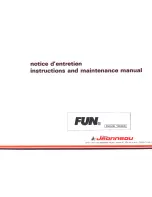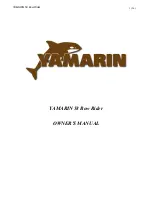
Energy 18 – User Guide
•
help the person in the water to get on board (the easiest way is across the stern),
•
if the person in the water is injured or cannot reach the deck by himself, someone
on board must put on a life jacket which is attached to the vessel with a safety rope
and the said person picks up the injured person in the water,
•
while the pulling the person on board, be extremely careful as the said person
might have suffered injuries to the spine or other parts of the body.
C. Fire
Fire is a very serious accident which can occur on board, as the vessel can burn down
quickly. If you do not manage to put out the fire in a few minutes, focus on your rescuing
instead of on extinguishing the fire. Abandon the vessel. Keep the portable fire
extinguishers at hand as the starting small fires can be put out quickly and easily. It is also
important that the portable fire extinguishers on board are of a suitable type.
•
Extinguish all smoking objects,
•
switch off the motor, the fans, the ovens,
•
if possible, throw the burning objects out of the vessel,
•
if possible, direct the squirt of the extinguishing agent into the source of the fire
and not the top of the flame,
•
if the vessel features an automatic fire extinguishing system for its motor, wait for
15 minutes after the system’s activation before you lift the cover of the motor. Keep
the portable fire extinguisher at hand.
•
Call for help,
•
activate the digital call for help (GMDSS), if you have the necessary equipment on
board,
•
put on a lifebuoy and prepare to abandon the vessel.
D. Sinking, capsizing of the vessel
In case of sinking or capsizing of the vessel:
•
try to switch off the motor and the electrical equipment before leaving the vessel,
•
check if everyone on board is wearing properly fastened life jackets,
•
check if all passengers managed to save themselves from the sinking vessel,
•
if the vessel is sinking, stay near the vessel, try to board it and activate the help
signal (signal rockets),
•
in extreme cases, try to swim towards the shore. Do not forget that the shore is
further than it seems and there is the possibility of drowning due to exhaustion
during swimming.
E. Collision and flooding
In the event of collision with another vessel or object in the water or in the event of
flooding:
•
lower the speed of navigation to reduce the amount of water breaking into the
vessel,
•
switch on the water pump,
v1.0
www.alfastreet-marine.si
18
















































